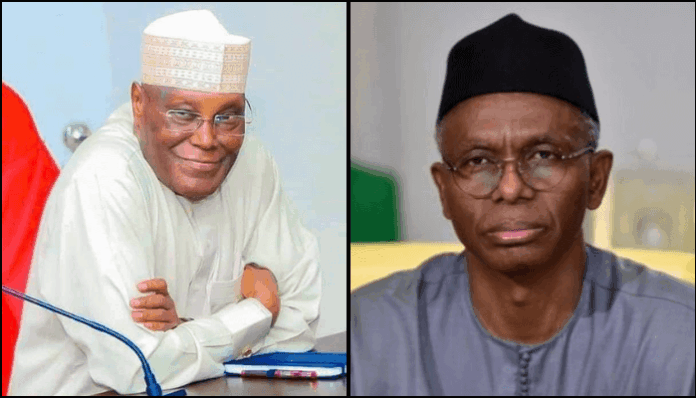By Kayode Androphos
In the intricacies of Nigerian politics, few figures are as polarizing as Atiku Abubakar. A seasoned politician, businessman, and former Vice President, Atiku emerges as a formidable player in the political arena. Yet, his journey is marred by a series of betrayals and inconsistencies that define his legacy.
As the 2023 presidential elections loom, these betrayals are not mere historical footnotes; they serve as potent reminders of how ambition can cloud judgment and alienate supporters.
In recent months, Atiku finds himself entangled in an unexpected political romance with Nasir El-Rufai, the former Governor of Kaduna State. This partnership, born out of desperation rather than genuine camaraderie, aims to forge a formidable alliance for the 2027 elections. However, the union is as unlikely as it is ill-fated.
El-Rufai, once a rising star in the political firmament, sees his relevance wane, reduced to a shadow of his former self. The two men, both seasoned politicians with checkered pasts, seek to leverage their combined influence to regain a foothold in a rapidly evolving political landscape. Yet, the chemistry between them is not one of mutual respect and shared vision; rather, it is a calculated attempt to cling to power in a system that increasingly favors fresh faces and innovative ideas.
The audacity of Atiku and El-Rufai’s alliance does not go unnoticed. The PDP Governors Forum under the leadership of Governor Bala Mohammed of Bauchi State, a body that historically wields significant influence within the party, boldly rejects their overtures. With a unified voice, the governors shot down the proposed partnership, effectively signaling that the political wind has shifted beyond the grasp of traditional power players.
Their rejection is not merely a dismissal of Atiku and El-Rufai’s ambitions; it is a declaration of independence from the old guard, a refusal to be shackled by the missteps of a bygone era. The message is clear: the era of political dynasties and backroom deals is over.
As the dust settles on the fallout from this rejection, it becomes increasingly evident that Atiku and El-Rufai’s political fates are now permanently sealed. The alliance, once a glimmer of hope for both men, has become a symbol of their isolation.
They are no longer the power brokers they once believe themselves to be; instead, they stand as relics of a political system that is rapidly evolving. The younger generation of politicians, armed with fresh ideas and a commitment to transparency, begins to emerge as the new vanguard of Nigerian politics.
Atiku’s past betrayals, marked by shifting loyalties and opportunistic alliances, alienate many of his former supporters. The narrative of a man who once serves as a unifying force within the PDP morphs into that of a self-serving politician, more concerned with personal ambition than the collective good.
El-Rufai, too, faces his share of controversies, including accusations of autocratic governance and divisive rhetoric. Together, they represent a bygone era, one increasingly at odds with the aspirations of a populace yearning for change.
The rejection of their partnership by the PDP Governors Forum becomes a watershed moment, signifying a broader rejection of the politics of the past. It serves as a reminder that the political landscape is no longer a playground for the elite; it transforms into a battleground for ideas and ideals.
The governors, in their bold stance, assert their authority and send a clear message to Atiku and El-Rufai: the time for old alliances and backroom deals is over.
As the 2027 elections approach, the implications of this rejection loom large. Atiku and El-Rufai find themselves on the fringes, their political ambitions thwarted by a political sand that shifts beneath their feet. The romance that once promised a revival devolves into a cautionary tale about the perils of political desperation. Their fates, once intertwined in the pursuit of power, become irrevocably separated by the very forces they seek to manipulate.
In the end, Atiku Abubakar and Nasir El-Rufai’s political romance serves as a poignant reminder of the fickle nature of power and the consequences of ambition unchecked by integrity. As Nigeria stands on the precipice of a new political era, the lessons learned from their misadventures resonate far beyond the confines of their ambitions. The future belongs to those who understand that politics is not merely a game of alliances but a commitment to the people and their aspirations.
In this evolving narrative, the political fates of Atiku and El-Rufai are sealed, by both the machinations of their past and by the unyielding march of progress and the unwavering desire for change. As the nation looks ahead, it is clear that the old guard must either adapt or fade into obscurity, leaving room for a new generation to rise and redefine the future of Nigerian politics.





